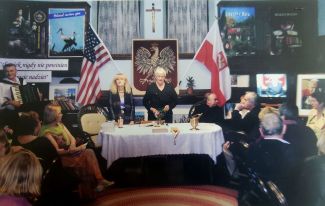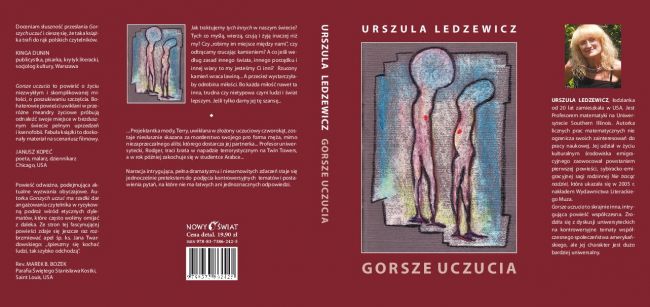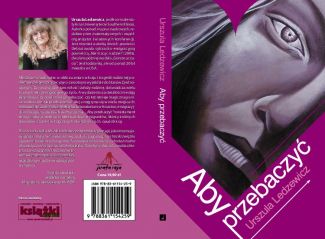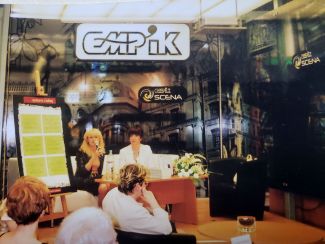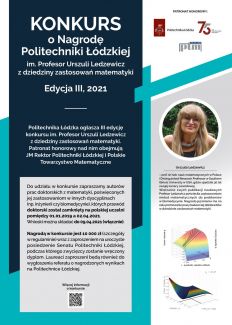She is the author or co-author of about 170 scientific papers and two monographs in Springer Verlag. Most of her publications were devoted to applications of mathematical methods to solve problems in biomedicine. She is the initiator and founder of the Competition for the Urszula Ledzewicz Prize of Lodz University of Technology, the aim of which is to promote research of doctoral students in the field of applications of mathematics. Prof. Ledzewicz's non-scientific passion is writing. She is the author of three novels in Polish and three in English.
When did you leave Poland?
I left Poland in 1986. I had already completed my doctorate at University of Lodz and received an interesting offer of Visiting Assistant Professor at Louisiana State University in Baton Rouge. A year later a similar position was offered to me by Southern Illinois University in Edwardsville, where I continued my scientific career. I am very grateful to this university for the opportunity for scientific development, which at that time, would have been much more difficult in Poland. I retired in the States in 2015 retaining my Distinguished Research Professor rank. In turn, Lodz University of Technology gave me the opportunity to continue my scientific career in Poland, which I greatly appreciate.
When did you start writing your first novel, Nie tracąc nadziei?
Nie tracąc nadziei was not my first novel, but it was the first novel I decided to publish. I wrote it relatively quickly, maybe in a few months, and it's almost 400 pages long, during a free semester in 2002 spent in Europe.
What was your motivation for writing this novel? What was the inspiration?
The inspiration for this novel came from my contacts in the Polish community in Saint Louis, Missouri, where I was once active. In 2000 we organized an evening of reminiscences of the so-called Sybiraks, i.e. former prisoners of camps in Siberia. We had several survivors of those camps in our community, and their memories really captured me. I realized that if no one wrote them down, their experiences would disappear with the passing of those people.
At the same time, I accidentally learned about the story of a Polish couple who, after surviving the camps in Siberia, became very successful setting up a business in Hollywood. The combination of these stories seemed attractive to me and that is how this novel came to be. I am very grateful to the Muza publishing house for making my literary debut possible.
In 2007, you published your second novel, Gorsze uczucia, about a close relationship between two women? Where did the idea for such a story come from?
The novel Gorsze uczucia is composed of two interconnected short stories, one of them actually describes a relationship between two women. I was inspired by meetings of the LGBT community, very active at my university. At these meetings, LGBT people shared their sometimes very painful experiences, showing that even such a progressive and liberal country as the United States is far from fully accepting such relationships.
Your third novel, Aby przebaczyć is the story of a young scientist who makes a desperate decision to move to the United States. Is this a fictional novel, or does it recount the experiences of someone you know?
You often hear that authors usually write their first book based on their own experiences. Aby przebaczyć is my first novel. I included a lot of my own experiences of living in Poland under communism and moving to the United States. Many scientists moving to the West at that time were put in desperate situations by the Polish security services. I was one of them. I also wove into the novel a tragic story I had heard about a doctor who disappeared without a trace while helping beaten protesters.
Was it the effect of longing for Poland or an attempt to look at the previous stage of your life and the difficult, painful history of our country from a distance?
Of course, in Polish emigration circles, we all long for our homeland, which is why the times described in my book were the subject of interesting discussions at author's evenings. Most of the emigration of my generation was politically motivated, and in a way, my novel is a look at that period, both from the distance of time and from the distance of a person already living in a different culture, a different society.
You also translate books. Does this apply only to your novels?
Yes, I translate into both languages, but only my novels. I am not officially qualified to translate literature. Besides, translation is definitely not my passion, it's a difficult, tedious job because you have to be very careful to avoid the so-called linguistic calumnies. It takes as much time as writing a novel from scratch, sometimes even more.
Are you planning to publish another book?
A long time has passed since my Polish editions. Currently, the most convenient publishing method is Amazon. In 2019, I will publish three items in English: two collections of short stories and a translation of the novel Aby przebaczyć. Last year I finished the English translation of my novel Nie tracąc nadziei and will be preparing it for publication.
I'm doing a sort of inventory right now, which means I want everything I've written so far to be available in both languages. I think I will be able to finish it this year and then I will start writing something new. There is no shortage of ideas, because my current life, in two countries at the same time, plus numerous travels, provide new topics
Your logical and analytical way of thinking helps you write books?
Absolutely! You can criticize a number of things in my books, they don't have the flowery style and descriptions of nature that some people like, but the logical plot structures are really well thought out. Usually, I put together a whole novel or short story in my head for a few weeks or days, and only then do I start writing.
In one of the reviews of my first book, a journalist from Gazeta Wyborcza argued whether mathematicians should write novels. I think they absolutely should because a logical construction of the plot is a great asset in literature.
You are the initiator and founder of the Prize in the Competition of Lodz University of Technology in the field of applications of mathematics. Where did you get the idea for this form of popularizing the queen of sciences?
The aim of my prize is not to popularize mathematics as such, because in Poland this queen of sciences, as you called it, is very well developed, but to draw special attention to the applications of mathematics in other fields. Poland has great achievements in theoretical mathematics, dating back to the times of Banach, but applications of mathematics are still a bit neglected in our country.
I see this perhaps better from an international and American perspective, because in the States the trend is almost the opposite. Even theoretical scientists are required to show how their research has the potential to advance other disciplines, to improve societies, etc. The purpose of my award is precisely to promote PhD students and researchers who are developing in this sense. I think I am a good example here, because I myself, after years of working in the theoretical field, turned to applications of mathematics in medicine, and I have most of my achievements in this field.
Why is it important to have a passion in life?
I understand that you think of passion as a break from professional work. Of course, it is very good to have it, especially when working in science, when you often "get stuck", which is very frustrating. Then you definitely need a break, to do something radically different.
Entering another field, in a sense, takes us into a different environment, expands our horizons, enriches us with new experiences. Interviews with journalists, book fairs, author evenings, letters from readers that found me even in the States, all this gave my life a new dimension that I had not experienced as a mathematician. I value that very much.
Interview by Małgorzata Trocha

